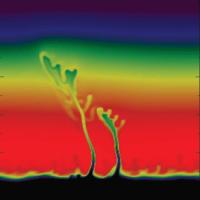Space Plasma Seminar
" New Equatorial Plasma Bubble Prediction Capability"
Brett A. Carter ABSTRACT: The occurrence of Equatorial Plasma Bubbles (EPBs) has become an important research topic in the field of space science in recent years, due to the adverse influence of EPBs on many important technological applications. One such application is the use of Global Navigation Satellite System (GNSS) signals, such as the Global Positioning System (GPS). The seasonal/longitudinal variability in EPB occurrence is relatively well understood, following decades of EPB observations spanning around the globe. A key unresolved issue is the daily variability in the occurrence of EPBs. To address this issue, an analysis of the daily GPS scintillation occurrence variability in several locations was conducted, and was complimented by coupled ionosphere-thermosphere modeling. It was found that the coupled ionosphere-thermosphere model, which was run independently of ionospheric observations, exhibited a daily variability that closely matched the observations. Further investigation found that the model's high-latitude ion convection pattern, which was driven by the Kp index, was the primary source of this variability. The ionosphere-thermosphere modeling revealed that the neutral winds at the equator are influenced by rather small changes in geomagnetic activity, and therefore the high-latitude convection within the model, from several hours prior. It is understood that neutral wind perturbations caused by enhanced ion convection, and associated Joule heating, propagate towards the equator and subsequently suppresses the upward plasma drift shortly after local sunset, which prevents EPB growth. An EPB prediction trial using solar wind data to forecast Kp hours in advance shows that one can reliably forecast EPB occurrence during peak EPB season with up to 95% accuracy. |
